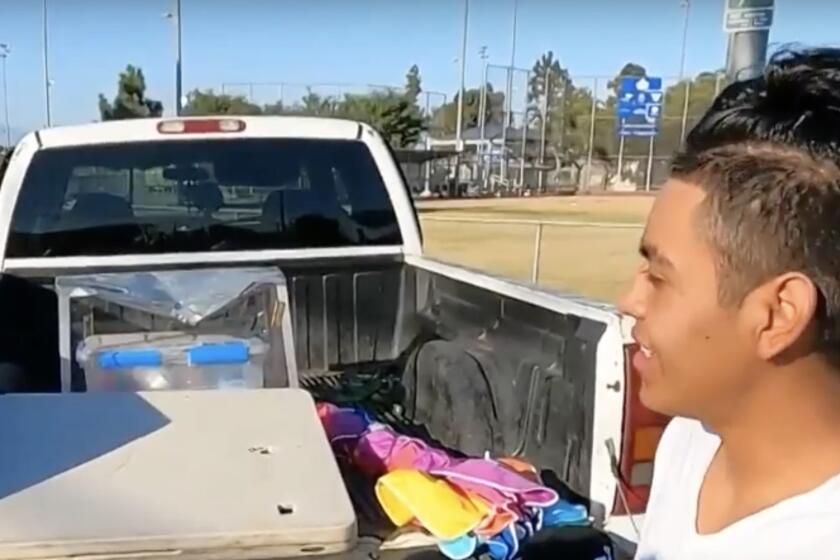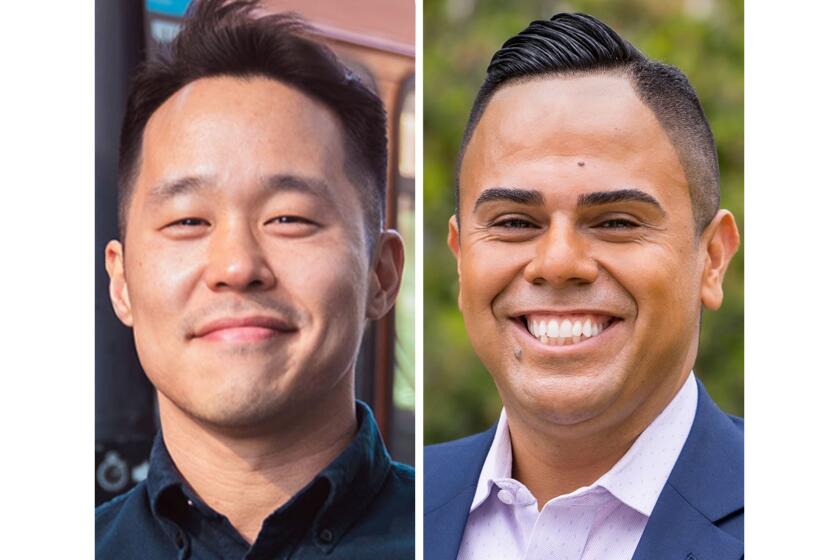Aging gay couple reconsider decision not to marry
The year was 1951. The U.S. military had just declared homosexuality an “unacceptable risk” and dishonorably discharged about 2,000 men and women from the armed services.
It was the same year Army Sgt. Bob Claunch and his commanding officer, Lt. Jack Reavley, fell in love.
More than half a century later, they are still together.
For most of their lives, marriage was not an option for gays. But when same-sex marriage became legal in California last year, an estimated 18,000 couples tied the knot. Claunch and Reavley, longtime Los Angeles residents, were not among them.
“I know that we’ve been together a long time,” Claunch said, “but the idea of cementing this relationship seems unnecessary.”
“What’s the point?” Reavley added.
After all, Claunch, 83, and Reavley, 85, said they don’t know if they would live much longer.
But for them, that is exactly why marriage matters: As the couple enters their twilight years, what will happen to one when the other dies is a growing concern.
Friends have passed, families are distant. Though they are registered domestic partners in California, federal marriage benefits -- including Social Security and survivor payments -- are out of reach, even for same-sex couples with valid marriage licenses.
Still, Claunch and Reavley are reconsidering. If the opportunity to marry comes again, they said they probably would take advantage of it -- and hope that federal marriage benefits would someday follow.
Today, the California Supreme Court will consider the constitutionality of Proposition 8, the ban on same-sex marriage approved by voters in November. The court’s ruling, expected within 90 days, could overturn the ban. But even if the ban were thrown out, federal benefits would still be unavailable to same-sex couples.
Claunch and Reavley are quiet about their feelings toward marriage. In recent months, as protests mounted against Proposition 8, they sensed that people were disappointed that they weren’t vocal marriage advocates.
To some degree, the couple said, they prefer to lay low because when they fell in love years ago, that was their only choice.
Reavley, who was drafted in World War II and remained in the Army Reserve, was called back to service during the Korean War. He became Claunch’s commanding officer at Armed Forces Radio in Munich, Germany.
It was love at first sight, Claunch said.
But being together was difficult. They couldn’t be seen alone together without raising eyebrows or risking the scrutiny of military police. Reavley had a wife and two young daughters. Both men felt weighed down with guilt.
Troops in the unit began to notice their relationship; rumors swirled. If discovered, they could have been court-martialed. After a year of hiding, they confronted their unit.
Reavley called a meeting. He had his secretary, a lesbian who had helped conceal the couple’s romance, pretend to phone headquarters in Frankfurt, Germany.
“I said, if anybody has anything to say about Sgt. Claunch and Lt. Reavley’s association . . . now’s your chance,” Reavley said.
No one said a word.
“We didn’t admit guilt, and we didn’t say we weren’t” gay, Reavley said. “So case closed. And the rumors stopped.”
Within a few months, Claunch and Reavley returned to the United States with honorable discharges.
Instead of returning to his wife and children in Texas, Reavley joined Claunch in Los Angeles. There, they told Claunch’s mother and sister that they were going to be together. Claunch’s family didn’t approve.
It was harder for Reavley’s family. Reavley returned to Texas while Claunch waited for him in New Orleans.
“Morally, it wasn’t the right thing for me to do, to leave her,” said Reavley, who chokes up when talking about his wife and family today. “She was such a sweet girl -- I hated to hurt her.”
After several months, Reavley wrote a letter to his wife when she was out of town. By the time she came home, he was gone.
“That was the only way to do it,” he said. “A clean break and for me to get the heck out of there, and out of the way so she could go on with her life.”
Reavley and Claunch hopscotched the country, chasing radio jobs. Eventually, they purchased KAPA-AM in Raymond, Wash., where they settled down and for the next 27 years broadcast music, sports and local news.
Retired and back in L.A., they stumbled into film and television. For the next two decades, they were extras in “General Hospital,” “The Bold and the Beautiful” and “Pretty Woman.” In 2006, Atwater Village-based filmmaker Stu Maddux released “Bob and Jack’s 52-Year Adventure,” a prize-winning documentary about their romance.
Last year, the couple considered marrying, announcing plans online and in a National Public Radio interview. But they changed their minds.
Today, Claunch and Reavley share a two-bedroom apartment at Triangle Square, a 104-unit complex in Hollywood of mostly low-income seniors who are gay, lesbian, bisexual or transgender.
The only reason to marry at their age, the couple says, is to receive federal marriage benefits, although that possibility may be far off. Given another chance to say “I do,” they say they would, although history makes them hesitant.
“I suppose it’s because for so many, many, many years and centuries, men have not married men, and women have not married women,” Claunch said. “We’ve been brought up not having anything like that, not wanting anything like that. . . . We’ve always been given the impression that it was a horrible kind of situation, and it is not easy to cross over that line.”
--
More to Read
Sign up for Essential California
The most important California stories and recommendations in your inbox every morning.
You may occasionally receive promotional content from the Los Angeles Times.










